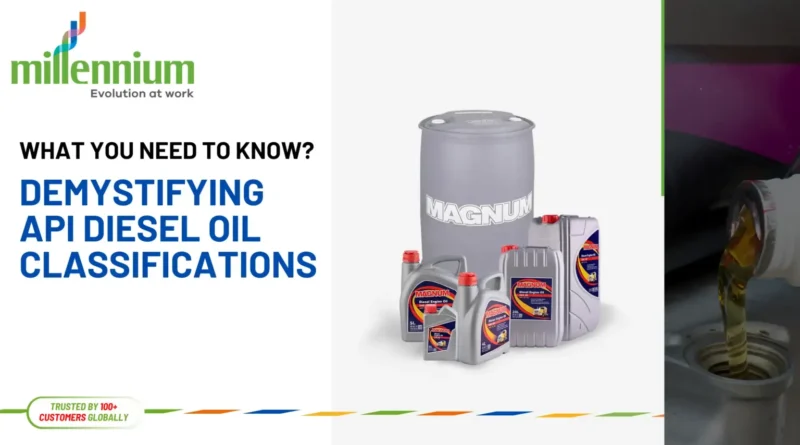Demystifying API Diesel Oil Classifications: What You Need to Know
Understanding Api Diesel Oil Classifications
When it comes to understanding API diesel oil classifications, it is crucial to recognize the role played by the American Petroleum Institute (API) in establishing a standardized system for evaluating the performance of diesel engine oils. The API classification system is designed to help consumers and manufacturers differentiate among various oils based on their quality and suitability for specific types of diesel engines.
These classifications are essential for ensuring the longevity and efficiency of diesel engines, which are subject to rigorous demands and conditions.
API diesel oil classifications are denoted by a combination of letters, with “C” standing for commercial compression-ignition engines, which are essentially diesel engines. The letter “C” is followed by another letter, which indicates the oil’s performance level. For example, API CI-4 represents a more advanced oil than API CH-4, as the additional letter signifies an improvement or evolution in the oil’s formulation.
The API classifications result from extensive testing and are continuously updated to reflect advancements in technology, changes in diesel engine design, and evolving regulatory requirements. These updates ensure that engine oils meet the higher performance criteria necessitated by modern diesel engines, which operate under more stringent conditions than their predecessors. As a result, using an oil with an appropriate API classification can help prevent engine wear, reduce emissions, and improve overall efficiency.
The Api Classification System
The API classification system for diesel oils is a globally recognized method designed to ensure the performance and quality of engine oils. Managed by the American Petroleum Institute (API), this system uses a series of letters and numbers to categorize oils based on their intended use, performance characteristics, and suitability for various types of engines and service conditions. The current classification system for diesel oils begins with the letter “C,” denoting oils intended for compression-ignition engines, more commonly known as diesel engines.
Additionally, the API classification system rates oils based on various criteria including, but not limited to, wear protection, oxidation stability, soot handling, and deposit control. By adhering to these standards, manufacturers can assure users that their products meet or exceed stringent industry requirements. Oils that are API-certified have undergone rigorous testing to verify their ability to perform under specified conditions, thereby providing end-users with a reliable way to choose the right oil for their specific needs.
Factors To Consider When Choosing Api Diesel Oil
When it comes to selecting API diesel oil, there are several critical factors to consider to ensure optimal performance and longevity of your diesel engine. One of the foremost aspects to take into account is the specific API classification that matches your engine’s requirements. Different engines may necessitate different performance levels as specified by API classifications. For instance, newer engines might require oils that meet advanced API CJ-4 or CK-4 standards, which offer better protection and performance attributes compared to older classifications like API CF or CG-4.
Moreover, always consider the viscosity grade recommended by your engine manufacturer. Viscosity affects the oil’s ability to flow at various temperatures, and using oil that doesn’t meet the required viscosity can lead to insufficient lubrication, causing increased wear and potential engine damage. It’s vital to check your vehicle’s manual or consult with the manufacturer to understand the recommended viscosity grades for your specific engine.
Benefits Of Using Api-Certified Diesel Oil
Benefits of using API-certified diesel oil are manifold, ensuring optimal engine performance, longevity, and environmental compliance. Choosing API-certified diesel oil guarantees that the product meets stringent quality standards set by the American Petroleum Institute (API), which translates into enhanced engine protection and performance. One of the foremost benefits is improved lubrication. API-certified oils possess the right viscosity and chemical composition to minimize friction and wear within the engine’s components, thus extending the engine’s lifespan and reducing maintenance costs.
Another critical advantage is thermal stability. These oils are formulated to withstand high temperatures without breaking down, thereby maintaining their protective qualities even under severe operating conditions. This stability not only helps in preserving engine efficiency but also prevents the formation of harmful deposits and sludge, which can lead to engine damage over time.
Moreover, using API-certified diesel oil can lead to better fuel efficiency. These oils are designed to reduce internal friction, allowing engines to run more smoothly and efficiently. As a result, vehicles consume less fuel, leading to cost savings and a lower environmental footprint. The cleaner combustion achieved with these high-quality oils also results in reduced emissions, helping to comply with stringent environmental regulations and contributing to a healthier environment.
Conclusion
In conclusion, understanding API diesel oil classifications is essential for making informed decisions about engine maintenance and performance. By demystifying the API classification system, we have revealed the intricate details that differentiate various types of diesel oils, enabling you to select the appropriate oil based on your engine’s specific needs. This knowledge empowers you to consider several critical factors including engine type, operational conditions, and manufacturer recommendations when choosing an API diesel oil, thus ensuring that your engine will run efficiently and last longer.
The benefits of using API-certified diesel oil are numerous. First and foremost, these diesel engine oil meet stringent industry standards for performance and protection. This means they have been rigorously tested and validated to deliver superior lubrication, reduced wear and tear, and enhanced engine cleanliness. By opting for an API-certified product, you are also committing to fuel efficiency and environmental protection, as these oils help minimize emissions and reduce fuel consumption.




